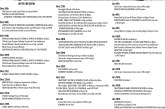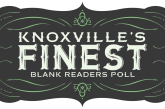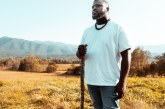“What am I gonna call it? I just kept drawing a blank…”
We meet on Rusty Odom’s home turf in South Knoxville, at the back of SoKno Taco’s patio, for a conversation we’ve been dancing around for years. After 200 print issues of BLANK Newspaper, it’s time.
Before I can even ask how he’s doing, Rusty dives in. “Part of the reason I don’t like talking about myself is I’ve got so many people to thank, and I’ve got so many people who have helped me along the way.”
His earnest attention to giving credit where credit is due is already attempting to swing the spotlight away from himself. What he may not realize is that so much of what many of us love about Knoxville wouldn’t have been possible without him, and there are a lot of us that would like to thank him, too. And maybe get to know the guy behind all these good vibes.
Raised by his mother and sister, Rusty grew up as the man of the house before he knew what that meant. He credits their influence for nurturing his ability to listen to his gut and, among other things, his love of reading. “I’ve always been a big newspaper and magazine reader,” Rusty admits. “I read every day. I might even read more than other people do, I’ve just never read a book.” Despite coming from a long line of teachers and falling in love with school on the very first day of kindergarten, sports and shenanigans led him down a path no one could’ve predicted.
Rusty is known throughout the regional music scene as something of a festival godfather, spearheading (at least in part) three BLANKFests, 12 Waynestocks, six Second Bells, three Holleroos, one Catoosa and, most recently, the inaugural Fourth & Chill, in addition to the many he’s mentored, co-founded and supported over the last 15 years or so. Before all the festivals though, there was – and continues to be – the paper you hold in your hands (or, less likely, are reading online).
“Everybody told me that a good-news newspaper was a bad idea,” Rusty says about the concept. This is a prevailing sentiment never more evident than in today’s news, but let’s back up to the beginning.
In the mid 2000s, Joe and Michele Karl took a chance on a plucky college dropout, giving Rusty a part-time high school sports beat for the Smoky Mountain Herald. Ryan Rodio got him that first meeting with the Karls after Rusty bummed a cigarette from Rodio at an Ice Bears game. “I asked him who he got his press pass from, and then I joked with him to get me a job,” explains Rusty. “Six months later, he called me and asked if I was still interested.”
After getting the gig, Rusty was further mentored by Chris Silcox, a seasoned writer who became his sports editor at the Herald after Rodio left. Never one to call himself a journalist, Rusty and his friend Kevin Mackie – fellow Herald writer/designer and publisher of his own independent paper, Open Vibe – argued about publishing Rusty’s Bonnaroo article, a crucial print to secure Rusty’s press pass (and free entrance) to the festival the next year. “It was August, and Bonnaroo happens in June, and I wanted to be able to cover it again, so we got in an argument, and he told me to start my own paper. And I said, ‘You know what, I will.’”
What can we do when faced with rejection or an obstacle to something we want so bad? If you’re Rusty Odom, you say, “Screw it” and do it yourself.
“After we got in that argument, I walked home from North Knoxville to the south side,” he says. “The next day, he called me and asked if I was serious about starting my own thing. I said, ‘I think so,’ and he showed me how to do everything. And I mean everything.”
It’s important to note that there would be no BLANK Newspaper without Kevin Mackie, who Rusty credits for mentoring him in every aspect of publishing, from formatting in InDesign to selling the ads that keep the paper free for readers.
Some of the first of those ads sold in BLANK were purchased by Jimmy Buckner. It was after the first issue had been printed when Rusty walked into Rays ESG and presented his spiel to the bartender, “Hey who handles marketing and advertising and all that good stuff?” Buckner was at a table across the room watching the whole thing. When the bartender looked Jimmy’s way, he waved Rusty over and after a long conversation, Buckner took a chance on good news and bought in.
“Jimmy’s a big supporter of people trying to create in this town,” Rusty recalls fondly, elaborating on how Jimmy’s charity fundraiser FISHstock gave him his start in the music-booking world as well.
That first edition of the paper was aptly named as “kind of a screw-you to everybody that said it wasn’t gonna work,” Rusty says. “I was like, OK then, I’ll just say that it’s nothing. But I couldn’t call it nothing, so I called it BLANK. And for the first few issues, the title was only the Morse code. I didn’t even put the word ‘BLANK’ on the cover.”
Enough local advertisers believed in a paper that Rusty wanted to call “nothing,” a paper without a real name on its cover, to help him raise $550.
“My computer was so old that I had to plug it in to get it to turn on, so I would go from business to business and ask them if I could have a moment of their time. Then, if they said yes, ask them if I could use an outlet to plug in. After I got a few yeses after dozens of nos, I called the printer and asked, ‘How much is it for 3,000 copies?’ I kid you not, they said, ‘$550.’”
Eighteen years and 200 issues later, that good-news newspaper created by someone who wouldn’t call himself a journalist has more than doubled in size (print-wise) and continues to put an exclamation point on the efforts of people in East Tennessee and beyond.
In the early years, Rusty was doing almost all of the work himself: sourcing and interviewing, writing, photography, graphic design, ad sales, print coordination, delivery and all the small tasks in between. Some months were missed if enough money wasn’t raised, but after a while, BLANK hit its stride. That’s not to say it was always smooth sailing, though. Rusty still recalls the sting of Kevin’s critique on some of those long nights where it was unclear whether or not the deadline would be reached. “You’re not ready,” Mackie would say.
“Those words still haunt me,” Rusty says. “He was right, but we always got it done, even if we didn’t sleep.”
Help was on the way, though. As time went on, people started paying attention, and that’s when the paper really caught on. Jessie Duval was an early editor, and Hayden Moore, a former fullback for the University of Tennessee, was surprised to find one of his short stories in print after Rusty stole his notebook and transcribed it for the paper.
“The part that I play in BLANK is: I pick the people,” Rusty shares in a rare assertion of direct input on the paper’s trajectory. What began as a two-man show began to grow, with every new addition working for the pleasure (not the profit) of publishing. A string of referrals led to the next chapter. John Flannagan was the first music editor of the rag.
Then photographer/writer Bill Foster introduced Rusty to Matt Rankin, who contributed written pieces before transitioning to editing. Together, they became the foundation for the BLANK footprint you see today.
The community has provided Rusty with an endless stream of inspiration and interested participants, many to whom he’s given his trust and a platform upon which they could grow. “If you micromanage people or if you expect them to do something wrong, they will,” he explains. “Because not only will you be searching for it, but there’s a pressure there. And so I’ve learned that it’s much better to empower someone and say, ‘Of course you can do this.’”
Throughout BLANK’s tenure, a growing number of contributors have published pieces about sports and music in every paper, alongside an ever-widening range of festival and event coverage, local stories, small-business spotlights and the occasional big break.
Rusty recalls spending three days on the road with Bill Landry for an exclusive on the ending of “The Heartland Series” and getting to interview promoter Ashley Capps, Bonnaroo co-creator and founder of AC Entertainment and Big Ears Festival. These folks, as well as local event organizers and business owners like Scott and Bernadette West, Maria Armstrong, Thomas Boyd, Bobby McCarter, Bryan Howington, Gina Truitt and Randy and Jenny Boyd, have continued to support the paper, even through the pandemic, and have helped to weave the fabric that spreads good news fit to print to delivery locations from Turkey Creek to Townsend.
“We can’t do the paper without the support of the people who advertise in it,” Rusty says. “It’s as simple as that. If anyone likes BLANK, I really hope they’ll take some time to seek out one of the businesses that support it and return the favor.”
There are innumerable ways to describe BLANK Newspaper. It’s a quilt, with over 200 squares (covers) that blanket our community with Knoxville’s Finest. It’s a “take-your-shoes-off, let-your-hair-down publication” filled with laughter, stories, memories and fun.
Asked about its longevity and impact, Rusty harkens back to his upbringing, to learning to trust his gut. “I don’t claim to really know what I’m doing because I didn’t get training to do any of this stuff. I don’t steer BLANK; BLANK steers me.”
When everyone told Rusty, “If it bleeds, it leads,” and that a positive newspaper was a bad idea, BLANK steered him down a path that created a most vibrant, exciting life. When the industry rang the death knell of print, surging toward the internet in what we’ve all seen become an algorithmic vortex full of rage bait, BLANK printed more copies, delivered to more locations and is coming out on the other side stronger than ever.
“One of the most encouraging things is we have this influx of young people, people who are currently in college or just out, who are actively [involved] with the paper,” Rusty says about the future of the publication. “We have more youth now than we’ve had at any point in our 18 years of existence. Young people are starting to pick up the paper more than they ever have. They’re sick of their phones. They’re craving something concrete and tangible.”
Always humble, Rusty would never credit one of the most valuable aspects of BLANK Newspaper and the reason for its current health: its human curator. Writers follow leads and writers pitch surprises that Rusty says always make his day. “I love learning about something new in town just as much as the next person,” he says. “So it’s always fun to help spread the word. People work hard in this town, so I love it when a writer wants to acknowledge that effort.”
That’s the real sweetness in life: the people we love and the stories they tell; the hunt for this paper at your local coffee shop or brewery; seeing a friend’s name in print and snagging them a few copies for the archive. BLANK Newspaper continues to be the only locally owned and printed alternative paper in Knoxville. It has survived the Great Recession, the online news bubble, the algorithms and whatever we’re going through right now. It’s free as ever, full of good news and most certainly not nothing. It’s thanks to Rusty Odom – and his curiosity, tenacity, resilience and trust – that this writer, among many others, has found a home in Knoxville.
And that Morse code on the front of those first issues? “It actually didn’t even say ‘BLANK,’” Rusty confesses. “I spelled it wrong; it said ‘SLANK.’”







